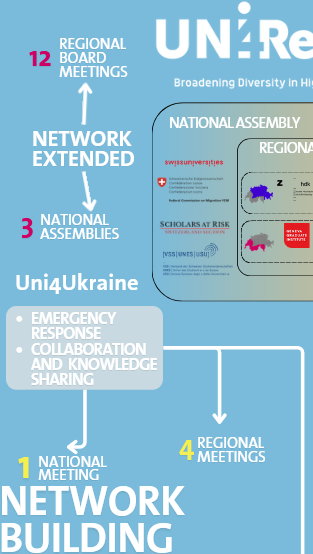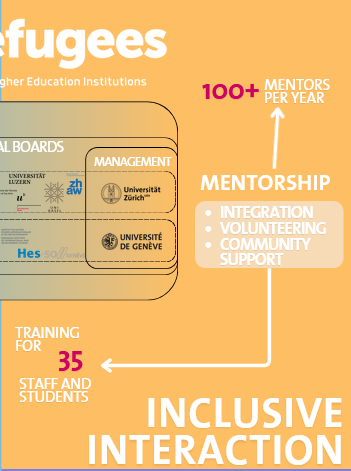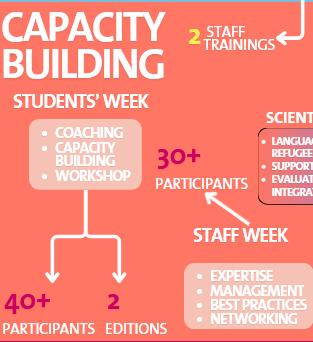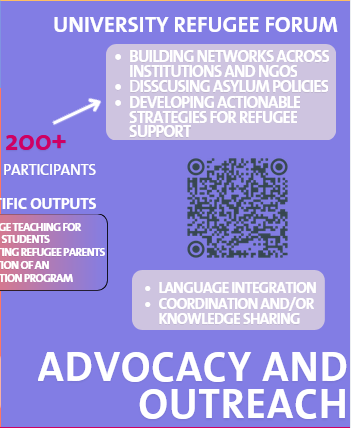As part of the closing symposium of the P-7 program, a poster session will be featured during the event on November 7-8, 2024, in Bern. This session will showcase the key results from the P-7 projects under the theme of "Diversity, Inclusion, and Equal Opportunities in Higher Education" (2021-2024)". Attendees will explore how Swiss universities have implemented diversity measures, with discussions focusing on equity, legal mandates, and the dismantling of institutional barriers. This exchange will further contribute to the ongoing development of inclusive practices in higher education.
Below, you will find Uni4Refugees' contribution to this event. Our poster highlights the key outcomes and the main impacts of the project, focusing on those that will leave a lasting mark in this field. To download the full poster, simply click on the image.

NETWORK BUILDING
 NETWORK EXTENDED
NETWORK EXTENDED
Over the past four years, the Uni4Refugee (U4R) program has expanded significantly to integrate other HEIs (Universities and Universities of Applied Sciences), helping to broaden its impact. Within this structure, the University of Geneva (UNIGE) took the lead for the Romandie region, while the University of Zurich (UZH) holds the same role for the German-speaking part of the country. Since the begining of th project, the University of Bern and of Basel joined the network. This distinction has been crucial in ensuring tailored approaches to regional needs while maintaining the program’s unified goals.
To ensure the smooth functioning of the organization and foster active exchanges between institutions, National Assemblies and Regional Assemblies were organized across the country. These assemblies provided a platform to discuss strategies and goals for the program. These exchanges bought together key stakeholders from both linguistic regions, allowing them to share insights and align their activities on common goals. This evolving structure facilitated cohesive progress while respecting the regional differences of Switzerland.
Uni4Ukraine
When the conflict began, millions of people were displaced, creating an urgent need for humanitarian aid, as well as longer-term educational support. Refugees seeking safety in neighboring regions, or slightly more distant countries like Switzerland, very soon sought out solutions and opportunities to continue their studies in HEIs.
Switzerland played a key role in the broader European response by leveraging existing academic networks like Uni4Refugees to support displaced Ukrainian students and scholars. The Uni4Ukraine initiative within Switzerland was designed to provide immediate assistance by strengthening our regional and national network in order to coordinate our support measures.
The University of Geneva (UNIGE) and the University of Zurich (UZH), were pivotal in coordinating these efforts, along with other Swiss institutions. These universities quickly mobilized to create scholarship programs, provide psychological support, and offer specialized courses for displaced Ukrainian students and scholars.
In the poster, we highlight how Uni4Ukraine exemplifies the resilience of the Uni4Refugees framework, especially in a time of crisis. The initiative was able to build on the solid foundation of existing partnerships and swiftly expand its reach to address the emergency needs of displaced Ukrainians. It also illustrates the flexibility and adaptability of the U4R program in the face of unexpected global challenges. In particular, it shows how the program was able to extend its resources to address urgent needs, making a real difference in the lives of those affected by conflict.
INCLUSIVE INTERACTION
 Mentorship
Mentorship
Mentorship programs play a key role in fostering diversity and inclusion in HEIs. Thanks to Uni4Refugees, we were able to enrol over 100 mentors each year, offering personalized support to refugee students across HEIs in Switzerland. Mentors not only guide mentees through academic and administrative processes, but also have the opportunity to receive training on themes and issues related to migration and diversity. This training helps them better understand the challenges faced by refugees, equipping them with the tools to provide effective and empathetic support to these students. This structure creates a supportive and enriching experience for both parties.
For more information, visit the UNIGE Mentorship Program.
CAPACITY BUILDING
 Students' week
Students' week
The capacity-building initiatives within Uni4Refugees are designed to equip mentors with the skills and knowledge necessary to effectively engage with complex global issues, such as migration and asylum. Events like the Students’ Week, held as part of the program, foster learning through workshops, seminars, and collaborative projects. These events provide attendees with practical tools to address refugee integration and educational continuity. They also encourage networking among students, professionals, and refugees, creating a community focused on long-term solutions.
Staff week
In addition to the Student Week, Uni4Refugees also organized a Staff Week, focusing on strategies for welcoming refugees into university environments. This event brought together staff from various universities to discuss a global approach to refugee integration, fostering collaboration on best practices, policies, and educational support. The event covered critical themes like asylum, inclusion, and intercultural communication, ensuring that staff were equipped to effectively support refugee students.
ADVOCACY AND OUTREACH
 University Refugee Forum
University Refugee Forum
The 2021 Forum focused on addressing the educational barriers refugees face and developing strategies for increasing access to higher education. The discussions revolved around key challenges such as recognition of qualifications, language barriers, and the mental health of displaced students. The forum also explored the role of universities in facilitating refugees’ transition into academic and professional life.
The 2023 Forum expanded on previous themes, emphasizing global solidarity and policy innovation. It highlighted new initiatives for strengthening academic pathways for refugees, enhancing cooperation between institutions, and leveraging technology to offer broader support.
For more details, visit the official pages:
2021 Forum
2023 Forum
Scientific outputs
Scientific outputs are essential for effective advocacy and outreach, particularly in addressing the diverse challenges faced by refugees. Research focused on language teaching for refugee students showed that tailored approaches ultimately facilitate language acquisition and cultural integration, enabling refugees to successfully resume their studies in HEIs. Similarly, a case study of a daycare structure for refugee students who are parents to pre-school children underscores the importance of a holistic approach to supporting refugee students. Providing resources and programs that empower students and their families fosters a more diverse and inclusive community for all students. Furthermore, a scientific evaluation of one of the refugee integration programs offers valuable insights into best practices and areas for improvement, ensuring that policies are informed by evidence and tailored to meet the specific needs of refugee populations. By disseminating these findings, advocates can strengthen their arguments, raise awareness, and mobilize resources to promote social equity and effective integration strategies for refugees.
If you want to acess the different ressources you can follow this link.